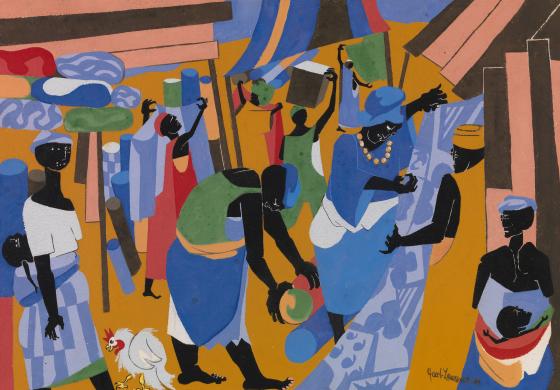Chrysler Museum of Art, Norfolk, VA
Oct. 7, 2022–Jan. 8, 2023
New Orleans Museum of Art
Feb. 10–May 7, 2023
Toledo Museum of Art
June 3–Sept. 3, 2023
On the 65th anniversary of the creation of Nigerian-based culture and arts publication Black Orpheus and the 60th anniversary of Jacob Lawrence’s first exhibition in Nigeria, the Chrysler Museum of Art will premiere Black Orpheus: Jacob Lawrence and the Mbari Club Oct. 7, 2022–Jan. 8, 2023. As the first museum exhibition of Lawrence’s Nigeria series and the international artists featured in Black Orpheus, the magazine of the Mbari Artists and Writers Club, it will explore the connection between Lawrence and his West African-based contemporaries during a period of artistic innovation emerging from socio-political upheaval. The exhibition features approximately 139 works in a wide range of media, as well as original letters, Black Orpheus issues and archival videos featuring Mbari Club artists.
Black Orpheus: Jacob Lawrence and the Mbari Club will travel to the New Orleans Museum of Art Feb. 10–May 7, 2023, before closing at the Toledo Museum of Art June 3–Sept. 3, 2023. The exhibition is co-organized by the Chrysler Museum of Art and the New Orleans Museum of Art and curated by Kimberli Gant, Ph.D., the Chrysler Museum’s McKinnon curator of modern and contemporary art, and Ndubuisi Ezeluomba, Ph.D., the New Orleans Museum of Art’s Françoise Billion Richardson curator of African art.
“Black Orpheus: Jacob Lawrence and the Mbari Club is the first in-depth investigation of Lawrence’s little-known time in Nigeria and the works he created there. In addition to presenting the larger interwoven artistic shifts happening in Nigeria during the first decade of the country’s independence, the project explores the importance of international exchange between African American and African artists, an area that also needs further research,” said Gant.
The exhibition positions Lawrence’s Nigeria series, a collection of 22 works on paper (tempera-and-gouache, crayon and ink), paintings and drawings, alongside lithographs, wood block prints, etchings, linocuts, watercolors, paintings, sculptures, reliefs and textiles by fellow Mbari Club artists. Five exhibition themes structure the gallery experience: Lawrence’s Nigeria; Artists of Osogbo; Zaria Art Society; Across the African Continent; and Beyond the African Continent.
In 1965, Lawrence presented 13 tempera and gouache paintings and nine crayon and ink drawings of Lagos and Ibadan marketplaces at the Terry Dintenfass Gallery in New York. These images were the culmination of a nine-month stay in Nigeria hosted by German cultural critic Ulli Beier, one of the founders of the Mbari Artists and Writers Club. Lawrence's residency in Nigeria placed him and his practice in conversation with Mbari Club members, an international consortium of artists, dramatists and writers in post-Independence Nigeria, including prominent figures within modern African art and literature such as Bruce Onobrakpeya, Vincent Kofi, Wole Soyinka and Chinua Achebe. They created the arts journal Black Orpheus (1957-75) and several other small literary publications to "encourage and discuss contemporary African writing," and soon after, the visual arts. In 1961, the Mbari Club founded a gallery space in Ibadan where they met, socialized and presented exhibitions. Black Orpheus and this gallery space led to numerous artists having their first published art reviews and their first art exhibitions in Nigeria. Among this group of now iconic modernist artists are Lawrence, William H. Johnson, Onobrakpeya, Kofi, Ibrahim El-Salahi, Francis Newton Souza, Suzanne Wenger and Naoko Matsubara.
The exhibition highlights these artists based outside the accepted “centers” of the United States and Europe. In pairing their work with Lawrence’s imagery, Black Orpheus: Jacob Lawrence and the Mbari Club reveals the nuances of global modernist art practices during the mid-20th century. Some, including the Nigerian artists Onobrakpeya, Uche Okeke and Demas Nwoko, were highly invested in developing a visually dynamic but politically charged approach for a changing Nigerian audience. The work was associated with the artists’ self-identified cultural and national alliances, reflecting Nigeria’s and Africa’s post-colonial era. Others, such as Brazilian artist Wilson Tibério and Japanese artist Naoko Matsubara, were producing works that echoed the sociopolitical issues they were facing in their respective countries. Finally, Lawrence’s Nigeria series represents an ongoing legacy of African American artists venturing to the African continent for knowledge and inspiration.
A full-color catalogue published by Yale University Press will accompany the exhibition and include essays by the exhibition curators and leading interdisciplinary scholars.


















